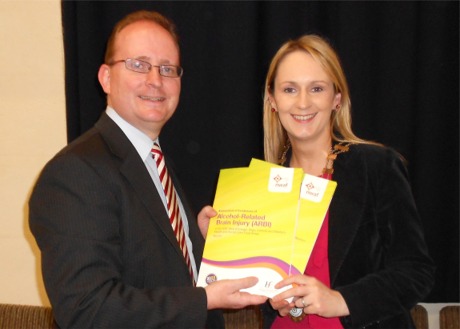|
|
Donegal's booze-related brain
injuries
06.07.11
UP TO 147 people in Co
Donegal may be suffering from Alcohol Related Brain
Injury, a new study reveals.
The report, carried out by the North West Alcohol
Forum (NWAF) was the first of its kind to be carried
out in Ireland.
It also found that cases of ARBI are expected to
rise as a result of the changing patterns of alcohol
consumption.
The survey found that 104 Donegal residents were
admitted to hospital with ARBI in the period
2005-2009. The total for the HSE North West region,
covering Donegal, Sligo, Leitrim and Roscommon was
163.
Research also suggests that ARBI accounts for 10% of
dementia cases and 12.5% of dementias in people
under 65.
The report outlines a summary of the work undertaken
to identify the incidences of ARBI in the HSE West
(Donegal, Sligo, Leitrim) and Western Health and
Social Care Trust in Northern Ireland (Limavady,
Derry, Strabane, Omagh & Fermanagh). |
 |
|
North West Alcohol Forum director,
Eamon O'Kane presents a copy of the Alcohol Related
Brain Injury report to Cllr Cora Harvey on one of
her last engagements Donegal mayor. |
NWAF director Eamon
O'Kane explained: “We felt that the lack of accurate
research was impairing the diagnosis of ABRI within
the North West/ cross border region and as such the
entire country. We embarked on a comprehensive study
that set out to identify the number of people
suffering from ARBI within a specific geographic
area on the North West cross border axis.
"Our report outlines how best to respond and
highlights best practice actions and recommendations
that would greatly improve the care of patients with
ARBI in this country. These are based on the
research investigation into this complex condition
in Australia, Scotland, Wales and England.”
ARBI is described as the 'invisible condition'
because of its complexity in terms of diagnosis. The
condition is associated with non-traumatic brain
injury brought about by factors leading to a
degeneration of physical and mental well-being. This
is distinguished from injury brought about by
physical trauma, known as acquired brain injury (ABI).
Given appropriate care half of those with an ARBI
can make a complete or significant recovery, whilst
a quarter will make no recovery at all. Often,
people with ARBI may be placed in inappropriate care
or accommodation settings, the researchers found.
Despite the lack of a formal care pathway for people
with ARBI, work has been initiated in the HSE
(Donegal) to develop a discharge pathway for
patients with the condition.
Mr O’Kane added: “Most patients do not have access
to these multi-disciplinary teams, and for this very
reason, creating and implementing a plan of action
is imperative for proper recognition of, and
treatment for, ARBI within our health and social
care system.” There is no single cause of ARBI,
which usually results from a combination of factors
including the toxic effects of alcohol on brain
cells, vitamin and nutritional deficiencies, head
injuries and disturbances to the blood supply to the
brain.
“Heavy drinkers are not likely to know that they
could be developing an ARBI condition due to lack of
insight and awareness,” Mr O’Kane explained. “Those
heavy drinkers are not likely to turn up in the
health system until they become sick, by which time
cognitive decline is likely to already have begun.
North West Alcohol Forum commenced this study in an
effort to raise public awareness on the hidden
implications of the damage excessive alcohol use can
have on the brain." |
|

